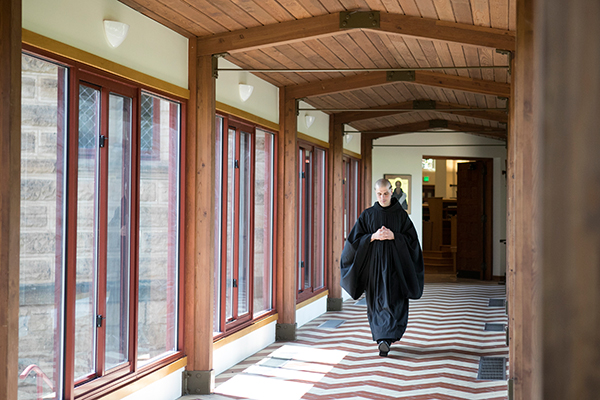Mutual Obedience
Fr. Adrian Burke, OSB
Thursday, May 14, 2020

"Obedience is a blessing to be shown by all, not only to the abbot but also to one another as brothers."
Rule of St. Benedict 71:1
The coronavirus pandemic is, at least for the time being, our reality, and it is a real nuisance! One of the tensions that many feel after so many weeks of social distancing is the itch to "reopen," to "return to normal." That's to be expected, but we have to be cautious about scratching that itch too quickly.
People are stressed over the need to protect others from contracting the virus and suffering from COVID-19. We must remember that, for our elders and those who have health issues already, this disease can prove deadly! That concern is no small thing – it is love that impels us to be concerned.
Many are also anxious, however, over the need to get their lives back, lives they enjoyed before coronavirus. People are losing sleep worrying about family finances, experiencing “economic anxiety,” and that, too, is to be expected.
Bearing the burdens of social distancing out of love for others could perhaps be framed in terms of St. Benedict’s concept of “mutual obedience,” paying attention to the needs of others. The demands of social distancing – more frequent and careful hand washing, proper sneeze and cough coverage (using the sleeve instead of the hands), avoiding the use of co-workers’ workstations, computers, phones and such – are, let’s be honest, truly annoying.
But one must be willing to endure these demands for the sake of others. By “others” I mean not just our co-workers, but their families! This virus’s stealth capabilities mean it can be carried home from here, and from home to here, without any symptoms being evident.
Mutual correction may also be needed. If done kindly and gently, this too is an act of mutual obedience. It’s a way to encourage others to be mindful or more careful. These reminders can be done without judgment or harshness as an exercise in mutual love and care and, like any good behavior, it takes practice!
St. Benedict says, completing the sentence quoted above, “it is by this way of obedience that we go to God” (RB 72:2). The way we go to God? Yes, because by caring and being concerned for others we demonstrate our love for God. By concretely loving others, according to Jesus, we love God (Mt 22:34-40; Mk 12:28-34; Lk 10:25-28).
Love is concrete; it is not a feeling, not primarily anyway. Love is a choice. In other words, love is action on behalf of others. If we can see the discipline of social distancing as a burden we’re willing to endure for the sake of others, perhaps it can seem easier, a lighter burden, done “in Christ” who makes all our burdens light (Mt 11:28-30) – truly a “blessing” for others.